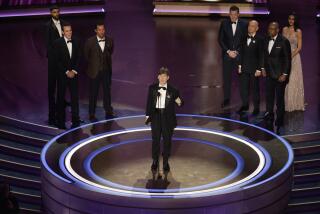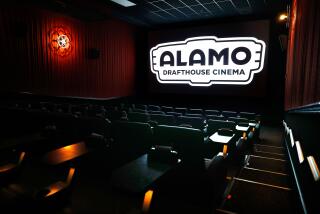Pumping Up the Volume : DTS Nears Settlement With Rival in Digital Movie Sound, but Now Faces Challenge From Sony
WESTLAKE VILLAGE — Digital Theater Systems is close to resolving its legal dispute with French rival L.C. Concept, thus freeing the company to turn its attention to Sony Corp., its latest major rival in the competitive digital soundtrack movie theater wars.
DTS, which is based in Westlake Village, will purchase worldwide rights to the digital sound patent of L.C. Concept of Paris, through an agreement expected to be signed within a week. Sources place the settlement in the $2.6-million range. But Bill Neighbors, DTS vice president and general manager, said the figure was off target. L.C. attorney David Makous wouldn’t comment.
Under the tentative agreement, DTS, and its part-owner Universal Studios, will agree to drop several lawsuits they filed against L.C. in recent months.
Digital movie sound quality is similar to compact discs used in home stereo systems. Through computer technology, it offers crystal-clear tones, free of the hisses and pops that sometimes plague traditional movie soundtracks.
DTS’ hardware is now in more than 2,000 theaters worldwide, giving it a leg up in a race for sound systems with Dolby Laboratories of San Francisco. But after several delays, Sony Corp. will introduce its Sony Dynamic Digital Sound system in 150 of its 900 Sony Theatres (formerly Loews Theatres) by the end of the year, said Jim Fiedler, SDDS president. Fiedler said the company has firm commitments from other exhibitors, but he wouldn’t disclose which ones.
Sony has had “lengthy discussions” with all of the major motion picture studios, said spokeswoman Gemma Richardson. The company expects to see its sound format on non-Sony Pictures Entertainment movies soon, Richardson said.
Meanwhile at DTS, Neighbors said the company isn’t fazed by Sony’s entry. “We’re just selling units and making movies,” Neighbors said. But he added, “I take them (Sony) very seriously.”
Sony is arriving late in a business that received its first big push last summer with Universal’s release of Steven Spielberg’s “Jurassic Park” in DTS. Spielberg, along with Universal, is an investor in DTS.
DTS is used in several key summer films, such as Universal’s and Spielberg’s “The Flintstones,” MGM’s “Blown Away” and New Line Cinema’s “The Mask,” which opens July 29.
But the studios are splitting their bets on digital sound formats. Paramount Pictures and 20th Century Fox are releasing some key summer films in both DTS and Dolby digital sound formats. Fox’s “Speed” and the Arnold Schwarzenegger hit “True Lies” carry both formats, as does Paramount’s “Forrest Gump,” with Tom Hanks, and the upcoming “Clear and Present Danger,” the third film based on Tom Clancy’s novels. That way, the movies can play in digital sound on whatever system an exhibitor has.
Meanwhile, Disney’s blockbuster “The Lion King” is a top box office draw featuring the Dolby digital sound format.
Despite Sony’s delay in getting its system to market, most acknowledge that Sony, with its vast resources, will be a significant force. The company’s pitch to exhibitors is that its system offers better sound quality and durability than its rivals. It’s also the only system to offer a digital track backup, should the principal digital track fail.
“Sony is the 800-pound gorilla in this thing,” said Bill Mead, vice president of film marketing at Dolby in San Francisco.
*
All motion pictures from Sony Pictures Entertainment--Columbia Pictures, TriStar, Sony Pictures Classics and Triumph Releasing--will feature SDDS. Columbia’s “The Next Karate Kid,” the latest installment in the popular series starring Pat Morita, will be the first film in major release featuring SDDS. It opens Aug. 5.
For the past year, Sony has been testing SDDS on Sony pictures in a handful of theaters, including General Cinema’s Galaxy in Hollywood, AMC’s multiplex in Century City and the United Artists theater in Westwood. “We’ve made this equipment foolproof,” said Fiedler.
Sony officials say they’re not concerned about the competition. “Sony is one of the fathers of digital sound,” said Fiedler.
At $13,800 per theater, Sony’s hardware is the most expensive of the three alternatives for theater operators. DTS’ hardware has a list price of $5,950 per screen; Dolby’s cost one-half to one-third more than DTS’ rate, but that doesn’t include the extra costs of buying the DTS sound discs, which go for $100 a set for each film print.
Exhibitors have been reluctant to commit to one format over another, convinced that eventually the industry will embrace one standard. They prefer not to buy multiple pieces of equipment.
But at the moment, some cinemas are investing in more than one digital sound system. For example, the independent Edwards Theatre Circuit Inc., based in Newport Beach, has installed both DTS and Dolby equipment in 65 to 70 of the chain’s 410 total screens.
“I feel both systems will coexist,” said chairman James Edwards.
There’s no doubt the public is sold on digital movie sound, said Tim Warner, president of the National Assn. of Theater Owners trade association of California and Nevada. But with the absence of a clear standard, exhibitors are investing in multiple formats, Warner said.
DTS has an exclusive deal with Universal that all of that studios’ films will be on DTS. In addition, DTS has an exclusive deal with Spielberg’s production firm Amblin Entertainment and with MGM/UA Distribution Co.
The DTS format has also been used on films from several other studios. So far, DTS has been on 39 movies; 2,368 theaters worldwide are equipped with DTS hardware.
Dolby reports that Dolby Stereo Digital Sound has been on 50 to 60 movies. Its hardware is installed at 700 to 850 theaters worldwide.
As for DTS’s likely settlement with small French rival L.C. Concept, the firm’s head, Elisabeth Lochen, may become a consultant at DTS, said DTS President Terry Beard. Lochen’s involvement with DTS isn’t part of the agreement, however.
*
With the purchase of L.C.’s patent, DTS has eliminated one competitor, albeit a tiny one.
L.C. wasn’t successful in Hollywood, but its digital sound format had been used in an estimated 30 pictures in France, Belgium and Switzerland since 1991.
With the L.C. dispute behind it, DTS will renew its push in Europe. It’s setting up a European headquarters in Brussels and it has put DTS recording equipment installations in five major European sound studios in four countries, said DTS’ Neighbors.
More to Read
The biggest entertainment stories
Get our big stories about Hollywood, film, television, music, arts, culture and more right in your inbox as soon as they publish.
You may occasionally receive promotional content from the Los Angeles Times.










